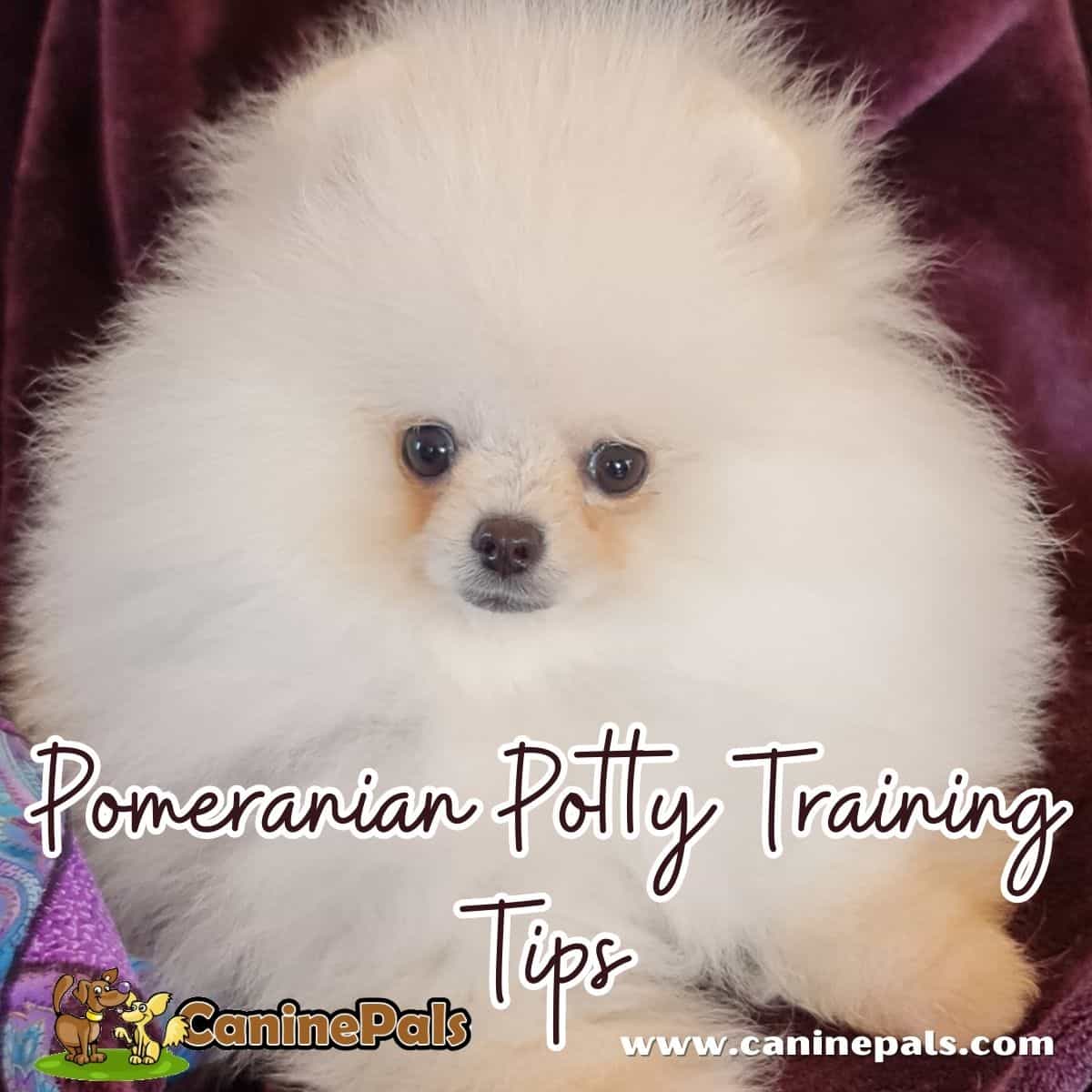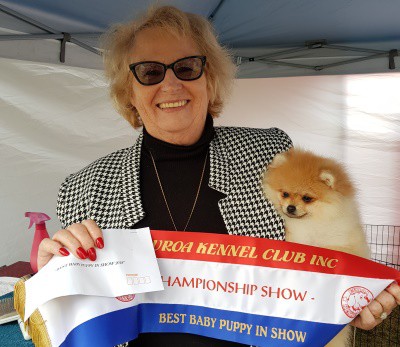Last Updated on April 12, 2024 by Denise Leo. Post first published on April 12, 2024.
Learn the best and most practical potty training tips to help your Pomeranian puppy learn good habits quickly! Get advice from the Pomeranian expert, Denise Leo, on puppy housebreaking lessons, avoid common issues, and give your pup a head start.
“Consistency is key in Pomeranian potty training. As a new pet owner, use lots of praise and treats and always watch for their cues. This method creates a supportive learning atmosphere and motivates your Pomeranian to achieve potty training success.”
advises Denise Leo, Pomeranian breed expert.
Raising a Pomeranian is full of surprises and challenges, and potty training a Pomeranian puppy is no exception. Pomeranian house training is one of the main challenges for many Pom parents.
The Pomeranian is a small dog with a lot of personality. It is very intelligent and responds well to consistent and positive training.
The good news is that your little fur buddy can learn where to go potty. It’s particularly easy if you know how to teach your Pom properly.
Pomeranian potty training is about consistency, patience, and a positive attitude. The ultimate goal is to house-train your pet and build a loving bond with your Pom.
This article will discuss everything you need to know to train your Pomeranian to potty in the right spot.
How to Potty Train a Pomeranian Puppy
You should begin Pomeranian house training when the puppy is between 12 and 16 weeks old. Pom puppies have enough control over their small bladder and bowel movements at this stage. Toilet training may take longer for a Pomeranian puppy younger than 12 weeks.
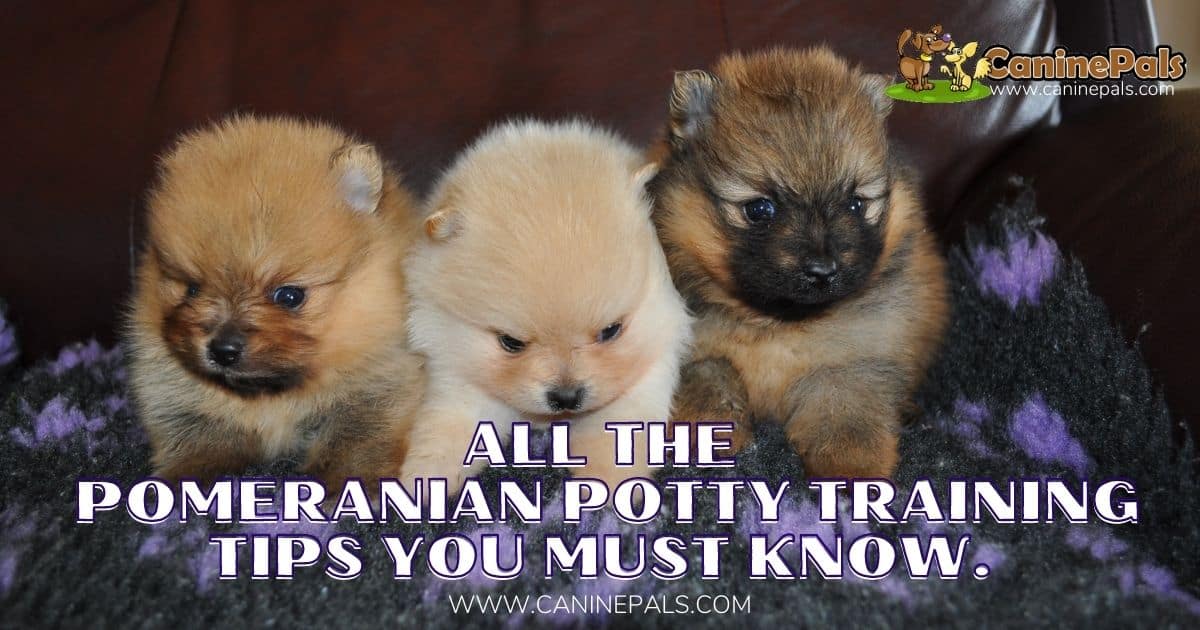
How Long Does it Take to Potty Train a Pomeranian?
It depends. There is no fixed timeframe for how long it takes to potty train a Pom puppy.
A Pomeranian puppy typically takes 4-6 months to be fully potty trained. However, every Pomeranian is individual, and many aspects come into play.
So, some Pomeranian puppies might take more or less time. Always use positive reinforcement techniques to cut down on the time it takes to have your Pomeranian fully potty trained. Remember that avoiding punishing them for accidents will only worsen the situation.
Signs Your Pomeranian Needs a Bathroom Break
As your Pomeranian begins to associate an outside space as the correct potty place, he will start to find ways to indicate that he needs a toilet break. Here are the most common signs showing your Pomeranian needs a bathroom break:
- Abrupt changes in activity, behavior, or play
- Circling and whining
- Sniffing and licking their rear
- Scratching, pawing, or sniffing at the door
- Returning to a previously soiled area or spot in the house where they eliminated
Usually, the older the Pomeranian pup is, the easier it is to identify these signs. Very small dogs may not be able to indicate promptly. If pet owners fail to comprehend these signs or act late, they might find life with their adorable Pomeranian frustrating.
Never let this happen to you!
Pomeranian Parent Tip: When you start Pomeranian potty training, it’s better to be quick when you notice obvious signs your Pom needs to eliminate. Take your Pomeranian out at regular intervals to avoid potty accidents.
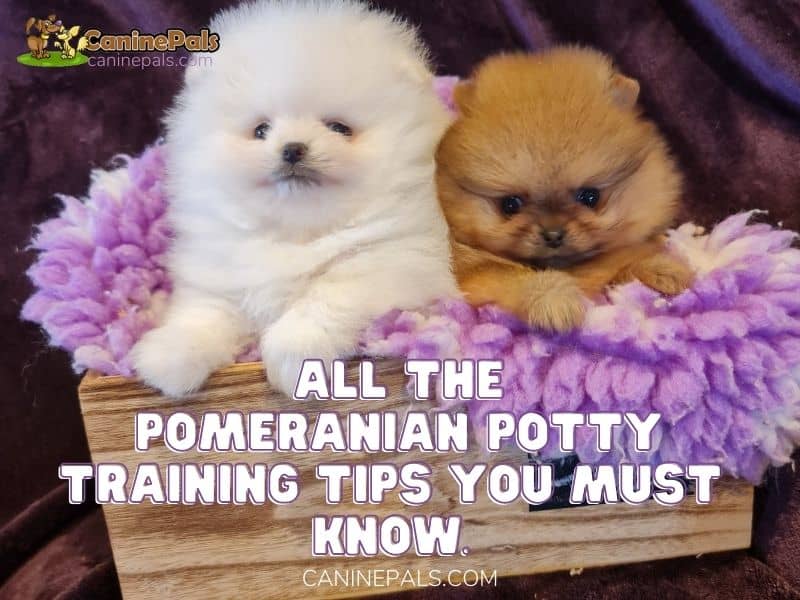
How to Potty Train a Pomeranian Dog
If you have already crate-trained your Pomeranian, toilet training will be easy. It is far easier if your Pomeranian respects what you say. A set routine will help smooth the way through this initial potty training stage.
Being consistent is one of the keys to Pomeranian house training. When you start to potty train your Pomeranian, try to follow these steps:
- Determine a set potty area:
It is best to pick a spot outside and take your Pomeranian there whenever needed. The sooner you communicate that there is a designated potty area and some areas are off-limits, the easier it will be to potty train your Pom. Like all dogs, Pomeranians develop a preference for using the same bathroom spot. You should pick an area nearby that is not visited by other puppies and is easy to clean up.
- Teach potty cue to your Pomeranian puppy:
Use verbal cues or commands when taking your Pomeranian outside to their designated potty area. This will teach your Pomeranian to go to that specific location to potty. Your Pomeranian will begin to recognize the command and understand what you want him to do. Use this command only when you want your Pom to use the potty area to avoid confusion.
- Maintain a regular feeding schedule:
Keep the Pomeranian on a regular feeding schedule and stay consistent with it. You should break up the Pom puppy feeding schedule into three small meals. Don’t leave uneaten food for the whole day. It’s better to take away their food between meals.
- Regular access to bathroom spots:
Give regular access to the bathroom place to go. Pick a bathroom spot outside, and always take your Pomeranian to that spot to do their business. Their scent will prompt them to go. Give your puppy at least six bathroom breaks a day.
- Regular bathroom breaks:
You have to ensure you give your puppy enough opportunity to do its thing. Remember that all Pomeranian puppies are individuals, and the timing will vary for each. You should expect to take the puppy out during these times:
- First time in the morning: Take the Pomeranian puppy out to eliminate the first thing in the morning, shortly after they wake up.
- After meals: Always take them outside after meals.
- During and after play: Take them out during and after playing.
- After nap: Take them out when they wake from a nap.
- After crate time: Take them out after spending time in the crate.
- Before bedtime: Make sure they go out the last thing at night and before they are left alone.
Pomeranians have small bladders and must be eliminated more frequently than larger breeds. Remember that Pom puppies younger than four months need a midnight potty break. Be prepared and set your alarm.
- Identify the signs:
Recognize your Pomeranian puppy’s pre-bathroom signs and behavior. Look out for signs that your Pomeranian is uncomfortable. These signs include whining, circling, barking, or changing abrupt behavior.
- Use positive reinforcement methods:
Potty training requires positive reinforcement methods. Do not punish your Pomeranian for their mistakes, like potty accidents in the house. Your Pom puppy needs to know when he does something good and reward them with praises and rewards. When your Pomeranian puppy takes care of business quickly outdoors, give praise and treat, then return indoors. The Pomeranian soon will learn the purpose of going outside.
- Stay with them during training:
Stay with your Pomeranian puppy outside until they are completely potty trained.
- Use a crate when you are not home:
Restrict your Pom’s access to the house when you cannot be there to supervise him. Confining your Pomeranian to a crate or defined space when you can’t watch your dog is a great idea. Your Pomeranian puppy will learn to view the crate as his haven and be reluctant to soil its area. Never confine your Pom puppy for longer than they can hold it.
- Be Consistent with potty training:
Being firm with your dog’s potty training routine would be best. Sticking to the same daily routine and skipping sessions will only confuse your Pomeranian about what is best for him.
- If you work, consider a dog walker:
Potty training can be a huge hurdle if you work long hours. Your Pomeranian’s progress will be slower if you can’t build a consistent routine. In these circumstances, it’s best to hire a professional dog trainer, dog walker, or dog sitter.
They can stay with your Pom puppy all day or drop in as a dog walker for a midday walk. So, potty training your Pomeranian may require much effort. Patience is the key, as the whole process may take time.
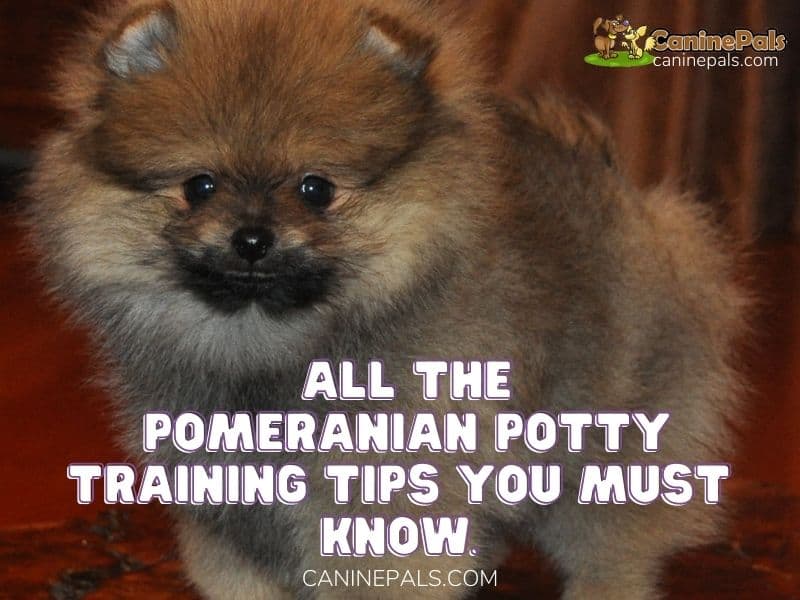
Crate Training
Crate training a Pomeranian puppy can effectively teach them the right place for their bathroom needs while providing a safe and comfortable space. Since Pomeranians are small breeds with relatively small bladders, consistent training methods are key to success.
When starting crate training, choose the right size crate that allows your little guy enough room to stand up and lie down comfortably but not so spacious that they can designate a corner for their bathroom. Introducing the crate gradually and positively, associating it with treats and praise, helps your new puppy feel at ease in their new space.
During the training process, it’s important to gradually increase your puppy’s time in the crate, starting with short intervals and progressively extending them as they become more accustomed to it.
Using a schedule for bathroom breaks, particularly after meals, playtime, and naps, helps your puppy learn when and where to go. Patience and consistency are the most important factors in crate training a Pomeranian puppy, as Mishaps are inevitable as part of the training journey.
Providing ample positive reinforcement and consistent training will create the ideal conditions for your puppy to excel in crate training. Before long, you’ll both reap the benefits of a well-trained and happy pup.
Pomeranian Litter Box Training
Yes, it is indeed possible to litter box train a Pomeranian puppy. At Dochlaggie Pomeranians, I have successfully trained numerous pups, and I am here to share my expertise with you.
Starting the Training Process:
I recommend starting the training at around three weeks of age. Place a low tray of kitty litter near the entrance of the puppy’s bed. This ensures that the litter tray is the first thing your Pomeranian steps onto when getting out of bed. As your puppy grows older, gradually move the tray further away.
Seek Guidance from the Breeder:
Discuss potty training with your breeder before purchasing if you want a litter-trained Pomeranian puppy. The breeder can provide valuable insights and advice.
Using litter boxes is an efficient way to potty train your Pomeranian puppy or teach an adult Pomeranian how to relieve themselves.
How to Housebreak a Rescue Dog
House-training adopted dogs can be easier than you think. Contrary to popular belief, teaching older Pomeranians to do their business outside is manageable. Here’s why:
1. Older dogs have better control over their bodies, allowing them to hold their bladder longer than puppies.
2. With a consistent schedule, older dogs learn and adapt quickly to going outside to relieve themselves.
So, if you’ve recently adopted an older dog, don’t worry! Follow a consistent schedule and give them time to adjust; you’ll soon have a well-trained companion.

Dealing with Pomeranian Housebreaking Problems
Expect your Pomeranian to have a few accidents in the house. It is a perfectly normal part of house training. Dealing with accidents starts and ends with not punishing or yelling at your Pomeranian for their mistake. Here’s what to do when dealing with housebreaking problems:
- If you find your Pomeranian pup in the act of having an accident in the house, immediately interrupt it.
- Make a sudden noise like “Oops, No, or Outside” to distract it. Immediately take your Pom out to his official potty spot.
- Don’t punish or yell at your Pomeranian for potty accidents in the house. It usually does more harm than good.
- Thoroughly clean up any soiled spots. Thorough cleaning of the area after a potty accident will remove any pee or potty scent.
- Take your Pomeranian out more frequently so he gets more opportunities to do his business on the designated spot. Once potty accidents are reduced, slowly increase the time between bathroom breaks.
- Always ensure no medical problems interfere with your Pomeranian’s ability to hold a potty. If your Pomeranian has had several lapses in potty training, make a vet appointment for a detailed health examination. Diarrhea, UTI, and kidney and bladder stones might also cause potty accidents.
Puppy House Training Supplies
- Disposable puppy pads, potty pads, or training pads.
- Reusable, washable pee pads.
- Enzymatic cleaner.
- Clean newspaper.
- Litter trays.
- Paper towels.
- White vinegar for odor control.
- Cat litter.
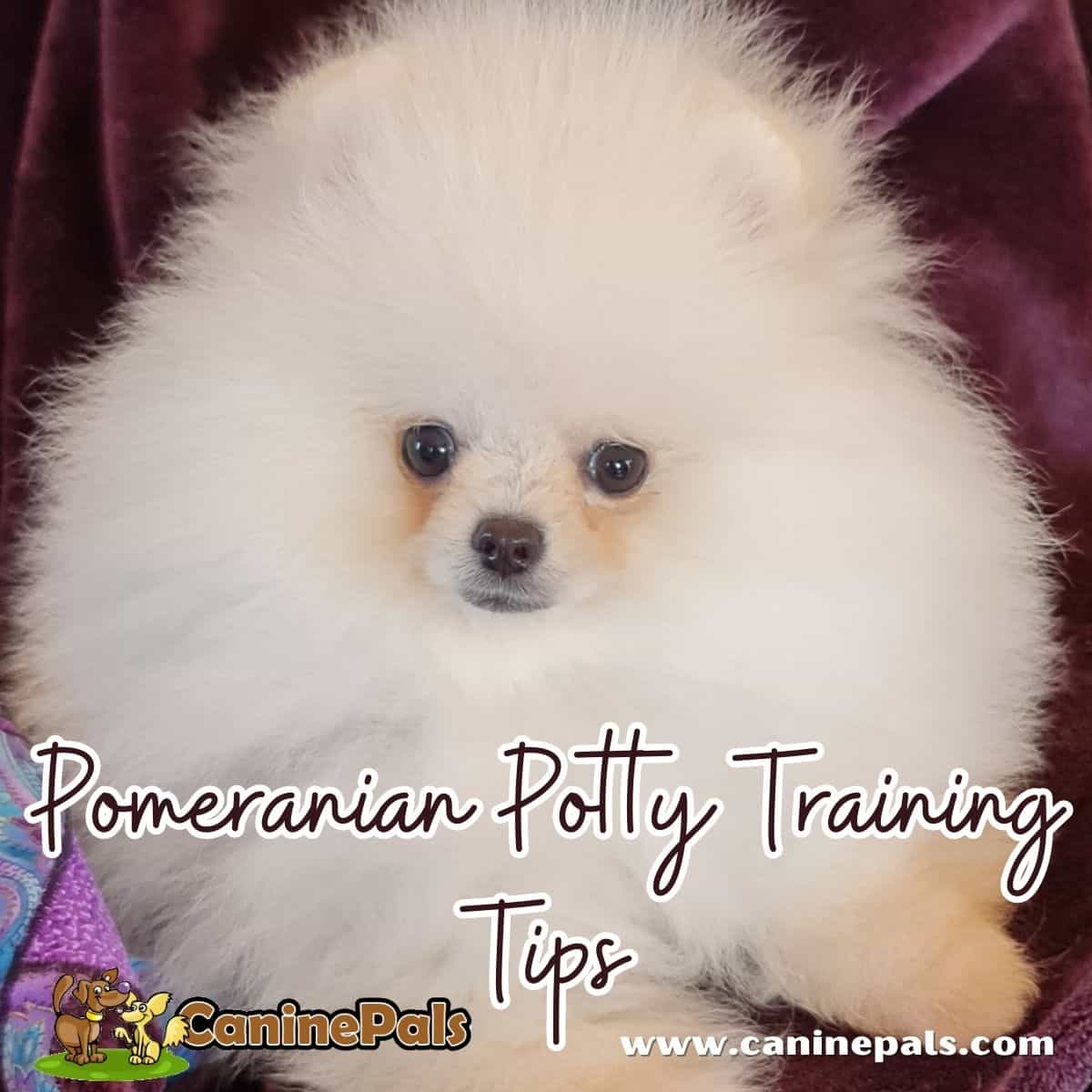
Pomeranian Potty Training Final Thoughts
Unfortunately, the housebreaking problem is one reason dogs end up in shelters. As a responsible Pomeranian owner, you must understand how to potty train your Pomeranian effectively.
While you’re house training, don’t worry if there are accidents. Remember that even a house-trained Pom puppy can have potty accidents! Pomeranian owners must understand that house training requires time, patience, and perseverance in the first weeks.
So, stay consistent, and don’t lose your patience. If you continue to take your Pomeranian puppy out at the first sign, it needs to go and be rewarded for appropriate behavior; eventually, it will be house-trained. Make the whole experience pleasant for your Pomeranian.
Offer treats to motivate and encourage good behavior. You will have to reshape your Pomeranian’s behavior with praises and rewards. Do you have any useful tips for Pomeranian potty training? Feel free to share your thoughts. We would be happy to hear from you!
Copyright CaninePals.Com. All Rights Reserved.
References and Further Reading:
- Official Standard of the Pomeranian (AKC). American Kennel Club, 2011.
- Official English Kennel Club Pomeranian Breed Standard, 2017.
- Kimbering Pomeranians “1891-1991”.
- Denise Leo, The Pomeranian Handbook.
- L.Ives, Show Pomeranians.
- L.Ziegler Spirer & H.F. Spirer, This is the Pomeranian.
- FEDERATION CYNOLOGIQUE INTERNATIONALE (FCI) German Spitz, including Keeshond and Pomeranian Breed Standards. PDF file.

